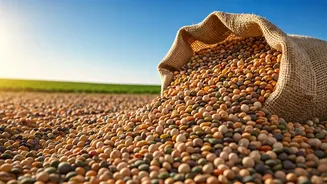Mission's Core Objectives
The primary goal of the Mission for Aatmanirbharta in Pulses is to significantly increase the production of pulses within India. The initiative is strategically
designed to reduce the country’s dependency on imports from other nations. This approach is intended to not only stabilize the supply chain but also to ensure that pulses, a key element of the Indian diet, are readily accessible and affordable for all citizens. Furthermore, it aims to enhance the overall economic resilience of the agricultural sector by empowering local farmers and promoting sustainable farming practices. This comprehensive strategy is geared towards achieving food security and self-reliance in the production of essential pulses throughout the nation. Through these focused endeavors, the initiative intends to provide a consistent and dependable supply of pulses, fortifying the nation against potential external disruptions.
Boosting Production Strategies
To accomplish its objectives, the Aatmanirbharta mission employs a multi-pronged approach to amplify pulse production. The strategy involves the promotion of advanced agricultural techniques such as improved irrigation systems, and the utilization of high-yielding varieties of pulse crops. It also includes providing crucial financial and logistical support to farmers, including access to credit, subsidies, and modern farming equipment. Additionally, the initiative focuses on disseminating knowledge about best practices in crop management, including pest control and soil health management. These measures help farmers optimize their yields. Furthermore, the government aims to establish efficient procurement and distribution networks to guarantee fair prices for farmers and ensure the availability of pulses in the market at affordable rates. This comprehensive strategy seeks to optimize output, increase farmer profits, and foster a more self-reliant and resilient pulse production sector throughout India.
Farmers' Empowerment Focus
A core aspect of the mission is the empowerment of Indian farmers, who are at the heart of the pulse production system. The initiative aims to provide farmers with access to better quality seeds, fertilizers, and modern farming technologies. This involves offering training programs and workshops that educate farmers on best practices for cultivating pulses efficiently. Subsidies and financial assistance are also offered to alleviate the financial burden and encourage them to adopt these practices. Furthermore, the government focuses on developing robust market linkages, ensuring that farmers have direct access to markets to sell their produce at fair prices. This focus on farmers not only boosts production but also strengthens their economic conditions. It will make pulse cultivation a more sustainable and profitable undertaking. Through these targeted interventions, the mission seeks to support the farmers in maximizing their potential and contributing to the overall success of the Aatmanirbharta initiative.
Why It Matters Deeply
The mission's importance is multifaceted. It directly addresses the need to decrease India's reliance on imported pulses, safeguarding the country against market volatility and external supply disruptions. This move enhances India's food security, ensures the consistent availability of essential pulses for the population, and reduces the risk of price fluctuations. Moreover, by supporting local pulse production, the mission boosts the rural economy, generates employment opportunities, and improves the incomes of farmers. Aatmanirbharta in pulses promotes sustainable farming practices, which are essential for long-term agricultural sustainability. This mission embodies the spirit of self-reliance, which strengthens the nation's capacity to meet its nutritional requirements and promotes economic growth within its agricultural sector. This ensures a healthier, more secure, and economically robust India, free from the constraints of depending on foreign sources for essential food items.














